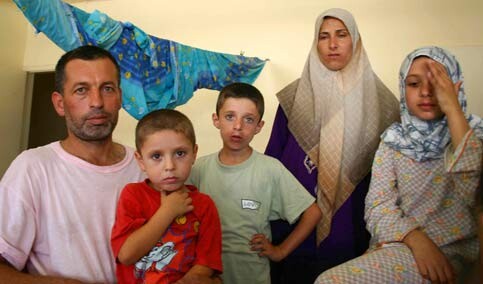IRIN 9 August 2006

Mohammed Rmeite says he will not move from Sidon, whatever the war brings. (Hugh Macleod/IRIN)
SIDON - Relief workers are struggling to cater to the needs of increasing numbers of displaced people arriving in Sidon, a port city 40km south of Beirut.
“People arrive here with only the clothes on their backs,” said Sheikh Khalil al-Solh, a member of local charity group The Islamic Gathering. “They have no money, no jobs and when they arrive they do not even have mats to sleep on. We’ve been able to absorb the displaced since the beginning of the calamity, but the moment Sidon is hit, there will be a catastrophe.”
According to the Lebanese Higher Relief Council, a government body set up specifically to manage relief efforts during this conflict, some 50,000 displaced people have fled to Sidon.
The current conflict started after the armed wing of Lebanese political party Hezbollah captured two Israeli soldiers on 12 July. In response, Israel launched a military offensive that has focused largely on the south of Lebanon, from where Hezbollah has been firing rockets into Israel.
The Islamic Gathering is providing food and shelter to 750 people who have taken refuge in a local university, which opened as a centre for displaced persons on 15 July.
Through funds provided by the Qatar Red Crescent, displaced families are being provided with three meals a day and shelter. According to al-Solh, the university is now running at maximum capacity.
When questioned by journalists, some of the displaced families living in the university express frustration and scorn. “We spoke out to the media earlier, but it has changed nothing,” said the father of one family. “Now I don’t think it will make any difference.”
Mohammed Rmeite, a labourer from the village of Mjadel, 25km south-east of Sidon, recalled how he and his family finally decided to flee the bombarded south. “We stuck it out for 10 days, only venturing outside when Israeli warplanes weren’t flying around,” he said. “But we quickly ran out of water, and the situation became too much to bear.”
As Rmeite recounted the 16 days he and his family have spent sleeping in one of the university’s classroom, an Israeli bomb exploded nearby.
“Does she have tanks? Does she have bombs?” asked one elderly man, shaking with rage, holding up a wide-eyed baby girl wrapped in a white sheet. “She was only one day old when the fighting began.”
Related Links
This item comes to you via IRIN, a UN humanitarian news and information service, but may not necessarily reflect the views of the United Nations or its agencies. All IRIN material may be reposted or reprinted free-of-charge; refer to the copyright page for conditions of use. IRIN is a project of the UN Office for the Coordination of Humanitarian Affairs.